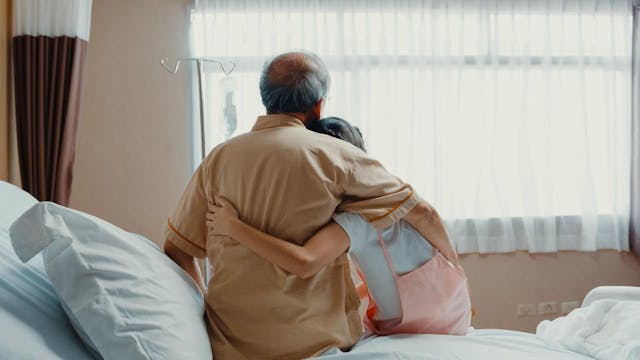Why Shouldn't We Take Cremated Remains Home or Scatter the Ashes?
Eternal Rest: The Art of Dying Well
•
3m 59s
Catholics must keep remains intact, lay them to rest in a sacred space, and maintain full respect for the body.
In the aftermath of loss, family members and friends are often left reeling, grasping for something to hold onto. This desire for stability or the chance to say goodbye is certainly understandable. It may seem comforting to keep an urn nearby, perhaps on the living room mantle. Well-intentioned family members might place their loved one’s ashes into jewelry or disperse them among other relatives.
However, the Church always seeks her children’s best interest, and for this reason she teaches that cremains must be kept intact and laid to rest in a sacred space. Storing an urn at home prevents those mourning from saying a final goodbye. It inhibits emotional, spiritual, and psychological healing.
“Part of the funeral process and why we have funerals is to say goodbye to our loved ones—the healing process doesn’t start until you’ve actually said goodbye.”
Scattering ashes and similar practices also detract from the integrity of the body. The way we treat each person, living or deceased, must speak to the dignity with which God created them.
Up Next in Eternal Rest: The Art of Dying Well
-
Why Should Cremation Be Done After A ...
The Church celebrates a different funeral rite depending on whether the full body or cremated remains are present.
If cremation is necessary, the Church prefers the celebration of the funeral Mass first, then the cremation. Disposition of the cremains takes place several days later.
“If one...
-
How is Hospice Paid For?
Medicare, Medicaid, and many private insurance companies cover hospice.
Patients and their families can contact their insurance provider to see what their particular coverage includes, such as the number of visits to the home by hospice nurses or the length of time allowed in a hospice facilit...
-
What is the Catholic Approach of Pall...
The main goal of palliative care is to relieve the pain and suffering of the patient. Its practices can be used alongside more traditional medical care. Provided that the treatments of palliative care respect the fundamental orientation of medicine towards the patient and does not encourage pract...



